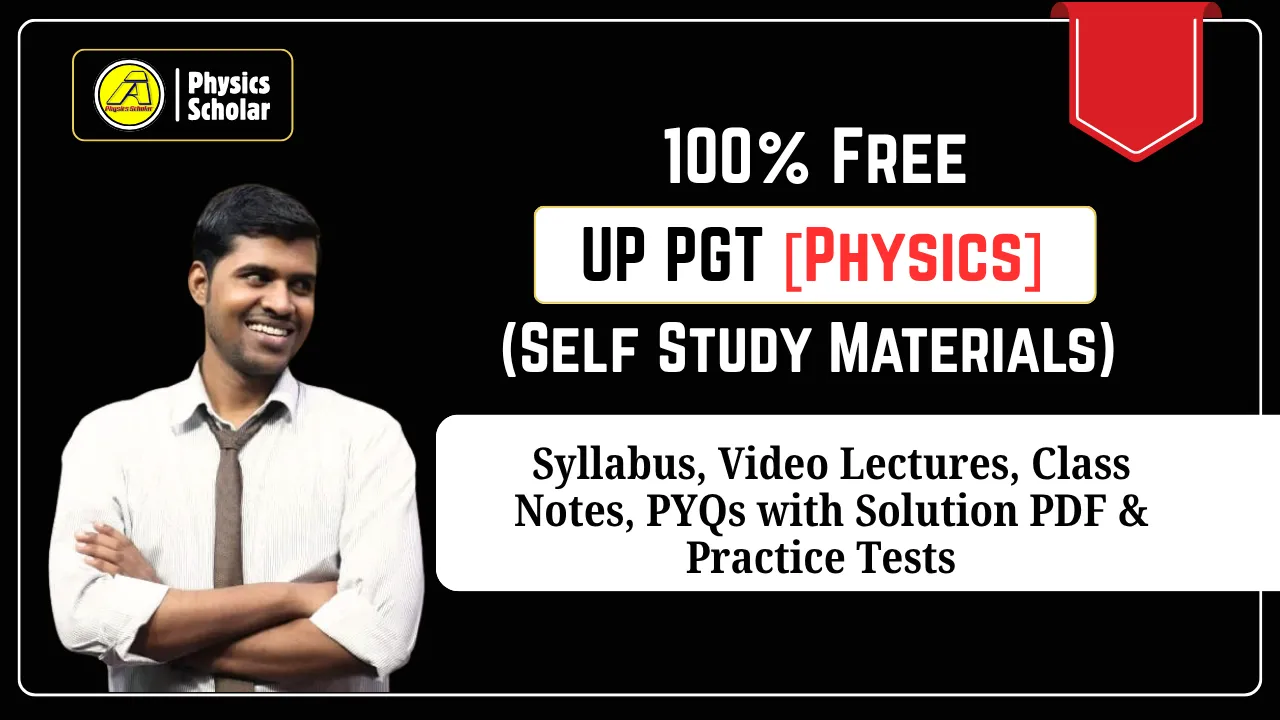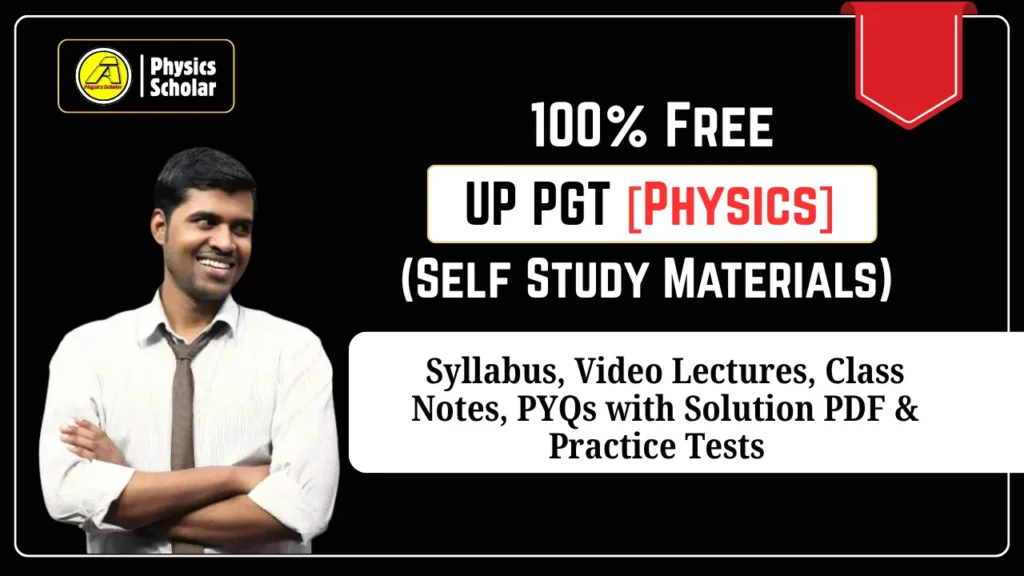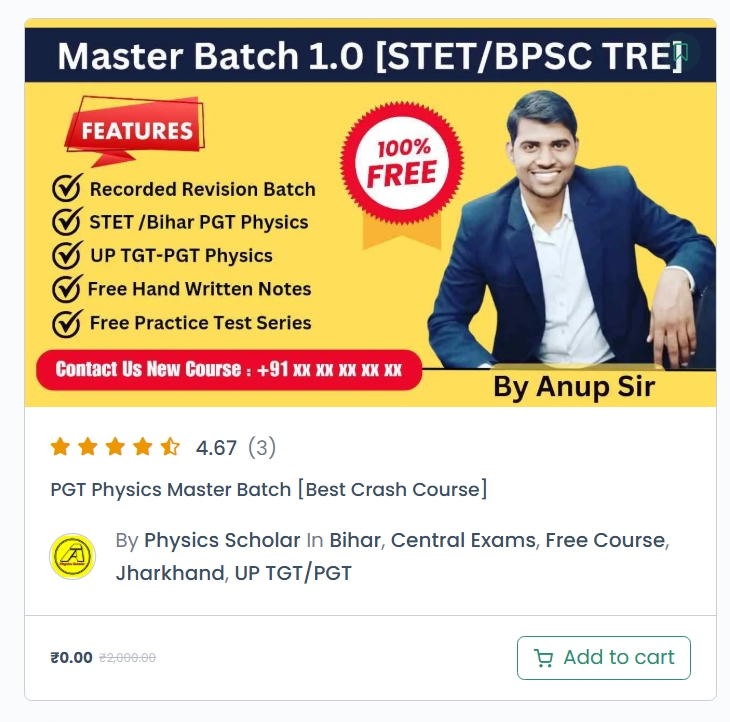UP PGT Physics Self-Study Materials: Complete Lectures, Notes, PYQs & Mock Tests [100% Free]

UP PGT Physics Self-Study Materials: Are you interested in becoming a lecturer of Physics in Uttar Pradesh? Prepare for the UP PGT Physics exam with our complete self-study solution! Get 100% free access to expert-curated class notes, solved previous year questions (PYQs), and a full course to boost your preparation. Start your exam preparation today with this all-in-one, cost-free resource!
Why Choose PhysicsScholar for UP PGT Physics Self-Study Materials?
The UP PGT Physics exam, conducted by the Uttar Pradesh Secondary Education Service Selection Board (UPSESSB), is a gateway to teaching Physics at the postgraduate level. With 125 MCQs, 425 marks, and no negative marking, the exam demands a strong grasp of concepts and rigorous practice. At PhysicsScholar, we provide free UP PGT Physics Self-Study Materials to help you:
- Understand the syllabus thoroughly.
- Access expert-curated video lectures and notes.
- Practice with PYQs and mock tests to simulate the real exam.
- Study at your own pace, anytime, anywhere.
Our resources are bilingual (English and Hindi), ensuring accessibility for all UP PGT aspirants. Let’s dive into the free UP PGT Physics Self-Study Materials we offer!

UP PGT Physics Overview
The Uttar Pradesh Post Graduate Teacher (UP PGT) Physics exam is conducted by the Uttar Pradesh Secondary Education Service Selection Board (UPSESSB) to recruit physics teachers for government schools in Uttar Pradesh. Here’s an overview of the exam pattern and selection process:
| Information | Details |
|---|---|
| Subjects | Physics |
| Pay Commission | 8th |
| Grade Pay | 4800 |
| Exam Type | Written + Interview |
| Marks Distribution | Written – 425 Marks Interview – 50 Marks Weightage – 25 Marks |
| Exam Mode | Offline (timing – 2 hrs.) |
| Negative Marking | No |
| Number of Questions | 125 (Each Que. 3.4 Marks) |
| Type of Questions | MCQ |
| Total Marks | 500 Marks |
UP PGT Physics Exam Pattern
- Type: Objective (Multiple Choice Questions)
- Duration: 2 hours
- Maximum Marks: 425
- Number of Questions: 125
- Marking: Each correct answer carries 3.4 marks
- Negative Marking: None
- Additional Weightage:
- Interview: 50 marks
- Special Qualification (e.g., Ph.D., B.Ed., M.Ed., National-level sports participation): 25 marks (maximum)
UP PGT Physics Selection Process
- Written Exam: Candidates who score the minimum qualifying marks in the written exam are shortlisted for the next stage.
- Interview: Shortlisted candidates appear for an interview, where their subject knowledge, teaching skills, and overall personality are assessed.
- Final Merit List: The final merit list is prepared based on the combined scores of the written exam and interview, along with the additional weightage for special qualifications.
UP PGT Physics Eligibility Criteria
- Master’s degree in Physics or a related subject with at least 55% marks.
- B.Ed. or M.Ed. degree.
- Age limit: Minimum 21 years.
Mechanics
- Calculation of vectors with reference to the SI system (Addition, subtraction & Multiplication)
- Gradient, divergence, & Curl
- Centre of mass, Linear momentum, Torque
- Angular Momentum, Conservation laws
- Centripetal force & acceleration, Centrifugal force
- Potential Energy, Gravitational Potential & field due to spherical shell & solid sphere
- Kepler’s laws, Projectile Motion
- Motion of Satellites, Rotational Motion
- Angular acceleration, definition of inertia with reference to Physics of Elasticity
- Stress & strain, Hook’s law, Elastic Constants & their relations
- Bending of beams, Torsion of a cylinder
- Surface tension, Molecular theory of surface tension, cohesive & Adhesive force
- Surface Energy, Capillary Action, Angle of contact
- Excess Pressure, Shape of Meniscus
- Viscosity: Ideal fluids, equation of continuity, stream line flow
- Bernoulli’s theorem, coefficient of Viscosity, Poiseuille’s Equation, Stoke’s law
Thermal Physics
- Thermodynamic system, Thermodynamic Equilibrium, Thermodynamic state
- Isothermal & Adiabatic Process, Concept of temp, Heat & Work
- Thermal Process, first law of thermodynamics
- Internal Energy, Joule’s law & its Application
- Carnot cycle, Carnot Engine & Refrigerator
- Absolute temp scale, Carnot theorem, Second law of thermodynamics
- Kinetic theory of gases, Maxwell-Boltzmann law of distribution of velocity
- Newton’s law of cooling, Stefan constant, Stefan-Boltzmann law
- Wien’s constant & temp, Black body Radiation
- Kirchhoff’s law, intensity & Energy density
- Pressure & Energy density, distribution of energy in the spectrum of black body radiation
- Wien’s distribution law, Wien’s displacement law
- Rayleigh-Jeans law, Planck’s law
Optics
- Geometric optics: Principles of light, Application, Cardinal points of coaxial optical system
- Combination of thin lenses, Aberration in lenses
- Achromatism in Prism & lenses, Apalantis
- Field of view & depth of field, Magnifying power & Resolving Power of Telescope
- Microscope, Resolving Power of eye, Dispersive Power of Prism
- Wave Optics: Interference: Condition for observing interference, temporal & spatial coherence
- YISE, Measurement of wavelength by measuring fringe width
- Spontaneous & stimulated emission, Basic idea about laser emission
- Ruby laser & He-Ne laser
- Diffraction: Fresnel & Fraunhofer class of diffraction, Power of optical instrument
- Rayleigh criteria
- Polarisation: Unpolarised, polarised & partially Polarised light
- Linearly polarised light and it’s production by Polarisation by Reflection
- Brewster’s law, Malus law
- Double refraction of uniaxial Crystals, Nicol prism, Polariser
- Huygen’s theory of double refraction
- Fresnel’s theory of optical rotation, Specific rotation & optical activity
Electricity & Magnetism
- Law of electrostatic induction, Gauss law, Electric field, potential
- Potential due to an electric dipole
- Elementary idea about multiple, Displacement & Polarization vector
- Lorentz electric Field, Types of Polarizability
- Parallel plate & spherical condenser, Parallel & series combination of condenser
- Energy of condenser
- Magnetostatics: Amperes law, Biot-Savart law
- Magnetic field due to wire of infinite length
- Magnetic field due to circular loop & solenoid, Helmholtz coil
- Magnetic Moment, Magnetic materials & Magnetization
- Magnetic susceptibility
- Current Electricity: Conduction of current through a wire
- Kirchhoff’s laws of resistors, Drift velocity, Ohm’s law
- Wheatstone Bridge, Meter Bridge, E.M.F.
- Carey Foster Bridge, Potentiometer, Primary & Secondary cell
- Heating effect of current
- Conversion of Galvanometer into voltmeter & Ammeter
Modern Physics
- Electro-Magnetism: Faraday’s law of EMI, Displacement current
- Self & Mutual Induction, transformer
- Loretz Force, Motion of charge in a mag field
- Mag field due to a moving charge
- Force between two current carrying straight wires
- Force on a current carrying wire in a magnetic field
- Alternating current: L-C-R Circuit
- Behaviour of Inductor, Capacitor & Resistor in A-C Circuit
- Resonance in L-C-R Circuit
- Quality Factor, Power Factor, Choke Coil
- Wireless Current: Thermionic Tube
- Thermionic Emission, Richardson Equation, Diode
- Space Charge, Limited Current curve, Triode Const
- Amplifier, Oscilloscope, Principle of image transmission
- Television, CRO, Solid Electronics, Modulator & Detector
- Einstein’s Photo Electric Equation, Work Function
- Threshold frequency, Ionization Potential
- Photo voltaic cell, Bohr’s theory of Hydrogen atom
- Energy Levels, Characteristic X-Ray Spectra
- Radioactivity, Half-life, Mass defect, Binding Energy
- Artificial transformation, Fission & Fusion
- Fundamental Particle, Nuclear Reactor
| Sr. | Unit/Topic Name | Download |
|---|---|---|
| 1 | Mechanics | click here (complete) |
| 2 | Thermal Physics | click here(complete) |
| 3 | Wave & Oscillation | click here (complete) |
| 4 | Optics | 1. Ray optics 2. Interference 3. Diffraction 4. Polarisation 5. Laser |
| 5 | Electricity & Magnetism | 1. Electrostatics 2. Current Electricity 3. Magneto Statics 4. Alternating Current 5. E.M. Induction 6. E.M. Wave |
| 6 | Modern Physics | click here (complete) |
| 7 | Electronics | click here (complete) |
Special Notes: This is Only for Educational Purpose.This is the official website of Physics Scholar. Dear Physics Aspirants “Physics Scholar” is a good platform to Prepration for TGT PGT and other Exams. Anup sir is a best faculty of physics. Physics Scholar Official Links:
- Check You Tube Channel: click here
| Free Full Length Mock Tests | Links |
|---|---|
| UP PGT Physics Mock Test 01 | Click Here |
| UP PGT Physics Mock Test 02 | Click Here |
| UP PGT Physics Mock Test 03 | click here |
| UP PGT Physics Mock Test 04 | Update soon |
| UP PGT Physics Mock Test 05 | Update soon |
| Previous Year Paper | Download Link |
|---|---|
| UP PGT Physics 2000 Question Paper Solution – | [Download Free PDF Now] |
| UP PGT Physics 2002 Question Paper Solution – | [Download Free PDF Now] |
| UP PGT Physics 2003 Question Paper Solution – | [Download Free PDF Now] |
| UP PGT Physics 2004 Question Paper Solution – | [Download Free PDF Now] |
| UP PGT Physics 2005 Question Paper Solution – | [Download Free PDF Now] |
| UP PGT Physics 2009 Question Paper Solution – | [Download Free PDF Now] |
| UP PGT Physics 2010 Question Paper Solution – | [Download Free PDF Now] |
| UP PGT Physics 2011 Question Paper Solution – | [Download Free PDF Now] |
| UP PGT Physics 2013 Question Paper Solution – | [Download Free PDF Now] |
| UP PGT Physics 2016 Question Paper Solution – | [Download Free PDF Now] |
| UP PGT Physics 2021 Question Paper Solution – | [Download Free PDF Now] |
How to Use PhysicsScholar’s UP PGT Physics Self-Study Materials
- Start with the Syllabus: Review the syllabus and prioritize high-weightage topics like Mechanics (30% of questions).
- Watch Video Lectures: Begin with our free lectures to build conceptual clarity.
- Study Notes: Use our handwritten notes for quick revision of formulas and concepts.
- Practice PYQs: Solve at least 20 PYQs daily to understand question patterns.
- Take Mock Tests: Practice full-length tests weekly to simulate exam conditions.
- Revise Regularly: Use our formula sheets and notes for last-minute revision.
Why Self-Study with PhysicsScholar Works
- Free Forever: All UP PGT Physics Self-Study Materials—lectures, notes, PYQs, and tests—are 100% free.
- Exam-Focused: Aligned with the latest UP PGT Physics syllabus and 2025 exam pattern.
- Bilingual Support: English and Hindi resources for all aspirants.
- Trusted by Thousands: Join our community of UP PGT aspirants succeeding through self-study.
Recommended Resources for UP PGT Physics
- Books:
- Concepts of Physics by H.C. Verma (Mechanics, Optics).
- Fundamentals of Physics by Halliday & Resnick (PGT-level concepts).
- NCERT Physics Class 11 & 12 (foundation for TGT/PGT).
- Additional Practice: Check platforms like Testbook or Toppersexam for more PYQs, but rely on PhysicsScholar for free, high-quality content.
Join the PhysicsScholar Community
Ready to crack UP PGT Physics 2025? Start your self-study journey with our free UP PGT Physics Self-Study Materials today!
- Download Free PDFs: Get notes and PYQs here.
- Take Free Tests: Try our mock tests here.
- Join Our WhatsApp Group: Connect with aspirants for free resources and updates.
With PhysicsScholar, self-study is all you need to succeed. Start now and ace UP PGT Physics 2025!


Nice use of images.
Also visit my webpage :: click here
Best platform ever for physics
Thank you for the appreciation.
Sir your lectures as well as test series are very helpful for us… thank you so much sir 🙂🙏🙏
Thanks for Anup sir and your team,
Jo hm logon ke liye itni mehnat krte h bina thake bina ruke
“World best plate form physics scholar “
The best platform for physics ✌🏻
Thankyou Anup sir🙏🏻
Thankyou 🙏 ma’am, we want only selections, aur ye apki bhi jimmedari hai ki apne preparation ko boost krte rhen.
[…] 100% Free Study Materials for UP TGT PGT & GIC Lecturer (Physics) for additional […]